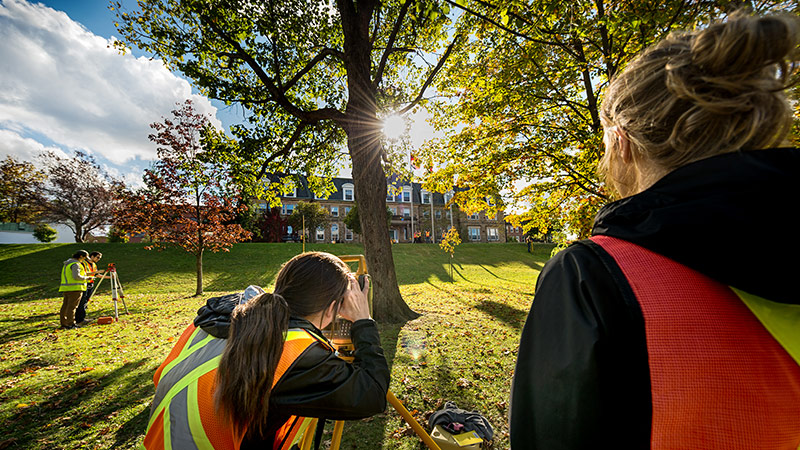GGE remote learning initiative will help address shortage of land surveyors
Author: Natalia Lanza
Posted on Jan 16, 2024
Category: UNB Fredericton

To address a growing deficiency of land surveyors and qualified geomatics professionals unable to meet surging demand, the department of geodesy and geomatics engineering (GGE) at the University of New Brunswick (UNB) has created GGE Remote, a remote learning solution.
The surveying industry in Canada, a vital component of the geomatics sector, has a huge capacity gap, intensifying further since the pandemic. Pre-pandemic, Canada faced a severe surveyor shortage - only half the required number were available for property surveying across Canada. Now, the demand has surged, with many surveyors working six days a week for 12-hour shifts daily to meet the profession’s social needs.
“The idea of offering online courses in geomatics arose from the necessity to address this capacity gap,” said Dr. Robbie Kingdon (BScE'05, PhD'12), an associate teaching professor and chair of GGE. “Our department began contemplating this project as early as 2018 when we invited a speaker to discuss online education and the potential of remote learning.”
Although there are many survey technicians who could become surveyors, training them poses a challenge.
“Many are already employed, often with family responsibilities, making it impractical for them to uproot their lives for three or more years to get the training that they need to become a surveyor,” said Kingdon.
The GGE program at UNB is one of only two university programs accredited to train surveyors in Canada, limiting the available options for individuals in Ontario seeking this specific type of education.
Simultaneously, there is a surge in demand from foreign-trained professionals seeking to work in Canada. Pursuing a bachelor of geomatics at UNB, however, extends their university degree to three years, delaying their entry into the workforce.
"The proposed solution from the department of GGE was to facilitate off-campus training in surveying, benefiting various individuals seeking a bachelor in geomatics," said Kingdon.
The GGE initiative allows those working remotely to fulfill academic requirements through remote learning. For international students, starting training before arrival enables them to start work immediately upon reaching Canada, leveraging their work experience from their home countries.
Nevertheless, challenges arise due to the program's emphasis on fieldwork, making it impractical to send instruments to every remote student. To address this concern, the department collaborates with UNB’s Strategic Partnerships Office, fostering partnerships with surveying companies.
"Those companies will in some cases facilitate training with instruments or provide access to tools and workspaces so students can complete their jobs; sometimes even conducting on-site training," said Kingdon.
The GGE department initiated the remote learning project in March 2020, conducting a global review to identify successful remote surveying programs. The University of Maine and the University of Southern Queensland (USQ) in Australia, along with individual instructors at UNB, British Columbia Institute of Technology and Four Point Learning had started offering remote geomatics courses before the pandemic.
The emergence of online surveying programs in the United States and island nations with geographical challenges further highlighted the need for remote options. With Canada's vast landscape and expensive travel, remote learning became a practical solution.
“People must relocate far from their families to attend either UNB or the University of Calgary, the only two options for land surveying education in Canada currently,” said Kingdon.
While most departments were adapting to temporary remote learning solutions, the GGE department worked towards a permanent one, where every course offered by the department would be in-person, streamed and recorded. This not only facilitated accessibility but also allowed individuals across Canada to pursue the degree without relocating.
The GGE remote program began in March 2021 with a two-year pilot from September 2021 to August 2023. The first graduate, a former UNB civil engineering student, completed their hybrid bachelor of geomatics fully remotely during the pandemic. By March 2023, the proposal had been submitted to the UNB Senate and later to the Maritime Provinces Higher Education Commission in April 2023, marking the final step for approval.
"Although it's been a lengthy process, all GGE courses at UNB are now officially hybrid, combining in-person classes with remote streaming and recording for off-campus students," Kingdon said.
Apart from the advantage for remote bachelor's students, there are significant benefits for current undergraduate students as well. Those dealing with anxiety, depression, illness or facing challenges attending classes can benefit from recorded lectures.
“Students with auditory difficulties, for example, will perform better with an auditory format they can control - pausing, rewinding, or adjusting speed and volume as needed,” said Kingdon.
This initiative is also a great opportunity for Geomatics professionals who want to take courses remotely for professional upgrading and to develop competencies that they don't otherwise have, or for those wishing to branch out and explore this highly relevant field.
Canada sets high academic standards for land surveyors, meaning foreign-trained professionals need to complete a three-year program or pass written examinations if they want to work as land surveyors. This initiative allows individuals to complete courses remotely before arriving, facilitating earlier entry into the workforce.
The Remote Hybrid Learning Initiative is a testament to innovation and adaptation in response to industry needs. It addresses the pressing demand for qualified surveying and geomatics professionals, provides a remote learning solution that expands education access, promotes flexibility and ensures inclusivity for students facing various challenges.
This transformative step not only benefits prospective geomatics professionals but also supports current students in overcoming barriers to learning, all while upholding high academic excellence in this critical field.
Learn more about UNB’s GGE remote learning program.
